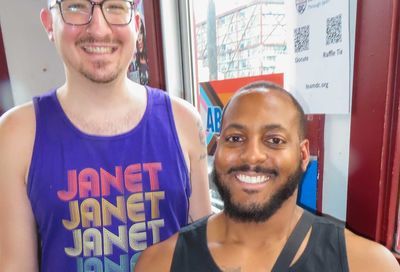Charlotte passes LGBTQ-inclusive nondiscrimination ordinance, five years after HB 2 debacle
Unanimous vote by Council approves various protections for LGBTQ people and other protected groups.

Five years after the state of North Carolina blocked a Charlotte nondiscrimination ordinance under the auspices of an “emergency” to block transgender people from using restrooms that match their gender identity in government-owned buildings, the Charlotte City Council has unanimously approved an LGBTQ-inclusive ordinance that they believe should be allowed to remain in place without interference from posturing politicians in Raleigh.
On Monday, the Charlotte City Council — following months of behind-the-scenes wrangling — passed an ordinance prohibiting discrimination against LGBTQ individuals in employment, housing, and public accommodations based on their sexual orientation, gender identity, and gender expression. It does not address public bathroom regulations, which are determined by the state legislature.
The ordinance also prohibits discrimination against people based on their natural hairstyles — a type of discrimination disproportionately impacting those in the Black community — as well as a person’s familial status, disability, veteran status, and pregnancy status.
Council members in the overwhelmingly Democratic city, however, rejected a separate proposal and substitute motion — proposed by Republican Council member Tariq Bokhari — that would have added protections based on a person’s political affiliation.
The ordinance applies to large and small employers alike, a point of contention for city attorney Patrick Baker, who said he worries about the city’s ability to handle a flood of discrimination complaints involving larger employers, reports The Charlotte Observer.
Instead, Baker had recommended the ordinance apply to businesses with 14 or fewer workers, which would close a loophole in federal law that exempts smaller businesses from having to comply with laws like Title VII, which prohibit various forms of employment-based discrimination.
The ordinance does not apply to religious organizations, including those with paid employees who are required to adhere to a religion’s beliefs as a condition of employment, and contains an exemption for private clubs or dues-paying membership-based groups, such as country clubs, fraternities, sports leagues, or rotary clubs.
Most of the ordinance will go into effect on Oct. 1, with the employment provisions taking effect on Jan. 1, 2022. The City Council will have to pass additional legislation determining how the city will handle discrimination complaints and enforce the ordinance, which may include levying fines against violators.
In 2016, Republican state lawmakers passed HB 2, which overturned Charlotte’s comprehensive LGBTQ-inclusive ordinance based on fears that provisions prohibiting denial of access to public accommodations would enable transgender individuals to enter and use restrooms or other intimate spaces matching their gender identity. In doing so, they also overturned all nondiscrimination ordinances — even those without provisions governing restroom usage — throughout the state.
The legislature’s actions prompted an economic backlash against the state, with critics saying that the so-called “bathroom bill” unfairly targeted transgender people for discrimination. Concerts and major conventions were canceled, businesses scuttled plans for expansions, the NCAA and other sports associations moved championships and sporting events to other locations, and the state lost an estimated $400 million in investments and jobs.
Related: Federal court says HB 2 “repeal” law doesn’t bar transgender people from public facilities
The law was ultimately repealed by “compromise” legislation that prohibited localities from passing their own nondiscrimination ordinances until December 2020 and removed express prohibitions on transgender restroom use while also requiring any changes in restroom regulations to be approved by the General Assembly.
Although Charlotte could have moved sooner to adopt the ordinance, Monday’s vote was the result of eight months of work to ensure that the city would not incur a backlash by passing provisions that might prompt the Republican-led legislature to once again interfere in local matters by eliminating any and all protections for LGBTQ individuals.
Monday’s vote makes Charlotte the tenth community in the state to pass an LGBTQ-inclusive nondiscrimination ordinance. The other localities with similar ordinances are: Apex, Asheville, Buncombe County, Carrboro, Chapel Hill, Durham, Greensboro, Hillsborough, and Orange County. In February, commissioners in Mecklenburg County, which includes the city of Charlotte, passed a resolution calling for the types of protections contained in the Charlotte ordinance, but that resolution lacks any enforcement mechanism.
Equality NC, which has long led the fight for LGBTQ-inclusive protections at the local and statewide level, praised passage of the ordinance.
“Throughout 2021, communities have come together to affirm that no one should face discrimination — and the vote tonight in Charlotte will double down on that undeniable momentum for LGBTQ equality,” Kendra Johnson, the executive director of Equality NC, said in a statement. “The passage of these protections, which include provisions for natural hair, sexual orientation, and gender identity, indicate strong progress for racial and social justice. Small towns, mid-sized cities, counties, and now the largest city in North Carolina have all taken steps to protect LGBTQ people and illustrate that NC is ready for these protections statewide.”

The transgender advocacy group Transcend Charlotte called the ordinance a “win, not only for the LGBTQ community, but for all Charlotteans.”
“We are only as strong as the least protected, and this expanded ordinance is a milestone toward equality in the Queen City,” Bethany Corrigan, the group’s executive director, said in a statement. “We applaud City Council for their bipartisan collaboration in passing this comprehensive ordinance and honor the advocates who have tirelessly sacrificed for this moment.”
Other organizations within the pro-ordinance coalition said the ordinance called for similar protections at the state and federal level.
“Leaders across North Carolina — including our U.S. Senators from NC — should look at what’s happening in our state: Communities are taking a stand to protect LGBTQ people from discrimination, which leads to safer, more inclusive places to live, work, and raise families,” Allison Scott, the director of impact and innovation for the Campaign for Southern Equality, said in a statement. “It’s time now to ensure that no LGBTQ North Carolinian is left vulnerable to discrimination — and that will require action from elected officials at every level of government.”
See also:
Foo Fighters trolled anti-gay Westboro Baptist protesters with disco music
Snickers apologizes for “shameful” ad after accusations of homophobia
Florida man won’t face hate crime charges for vandalizing Pride flag crosswalk
Support Metro Weekly’s Journalism
These are challenging times for news organizations. And yet it’s crucial we stay active and provide vital resources and information to both our local readers and the world. So won’t you please take a moment and consider supporting Metro Weekly with a membership? For as little as $5 a month, you can help ensure Metro Weekly magazine and MetroWeekly.com remain free, viable resources as we provide the best, most diverse, culturally-resonant LGBTQ coverage in both the D.C. region and around the world. Memberships come with exclusive perks and discounts, your own personal digital delivery of each week’s magazine (and an archive), access to our Member's Lounge when it launches this fall, and exclusive members-only items like Metro Weekly Membership Mugs and Tote Bags! Check out all our membership levels here and please join us today!


























You must be logged in to post a comment.